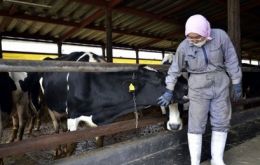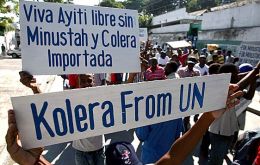MercoPress. South Atlantic News Agency
Health & Science
-
Wednesday, July 20th 2011 - 11:09 UTC
Fossils discovered in Uruguay could derail America’s population-origin theory

Recent excavations in Uruguay to uncover and begin researching fossilized remains estimated to date back 29,000 years could shoot down the theory that the populating of the Americas came via the Bering Strait some 12,000 years ago, Uruguayan scientists said.
-
Wednesday, July 20th 2011 - 01:47 UTC
Beef scare in Japan: caesium contaminated meats reached consumers

Japan has imposed a ban on all beef coming from the prefecture of Fukushima, where three nuclear reactors melted down following the March 11 magnitude 9.0 earthquake and tsunami. The Japanese government is also apologizing for its delayed response to radioactive meat reaching the market.
-
Thursday, July 14th 2011 - 07:13 UTC
Controversy in the US: severely obese children “should be placed in foster care”

The government should have the right to remove severely obese children from their parents' home and place them in foster care, two US health experts argued in a controversial editorial published Wednesday in the Journal of the American Medical Association.
-
Thursday, July 7th 2011 - 18:36 UTC
FMD, PPR, brucellosis and rabies, next FAO-OIE disease elimination targets

Foot and mouth disease, FMD, brucellosis, rabies and Pest des Petites Rumiants (PPR) are the next disease-elimination targets for FAO and OIE following success over rinderpest. The FAO conference officially recognized last week global freedom from the deadly cattle virus.
-
Thursday, July 7th 2011 - 17:00 UTC
Uruguay praised by WHO as pioneer in combating the global tobacco epidemic

The World Health Organization, WHO praised Uruguay and Canada as pioneers on legislation demanding large graphic health warnings on package of tobacco, on the release of its third periodic report on the global tobacco epidemic.
-
Tuesday, July 5th 2011 - 16:29 UTC
How seafood, oil and tourism made ’squidionaires’ and the Falklands’ rich

Caroline Graham from London's Mail on Sunday visited the Falkland Islands for a week and chance had it she arrived when a commercial oil strike was announced by one of the several companies exploring offshore the Islands.
-
Friday, July 1st 2011 - 06:39 UTC
Philip Morris launches legal action against Australia; similar to Uruguayan case

Tobacco giant Philip Morris International launched legal action this week against the Australian government over the country's plans to strip company logos from cigarette packages and replace them with grisly images of cancerous mouths, sickly children and bulging, blinded eyes.
-
Thursday, June 30th 2011 - 20:17 UTC
US says Haiti cholera epidemic was imported, probably UN Nepal peacekeepers

Evidence strongly suggests UN peacekeepers from Nepal were the source of a cholera epidemic in Haiti that has killed more than 5,500 people, said a new report by the US Centres for Disease Control Prevention.
-
Thursday, June 30th 2011 - 07:09 UTC
US daily calorie intake up 30% in 30 years: cut on snacks and king size portion

Snacking and super sizing are two of the dieter's worst enemies, research suggests. The average daily calorie intake in the US has increased by almost a third in 30 years, reaching 2,374 kilocalories.
-
Wednesday, June 29th 2011 - 23:03 UTC
KLM will begin fuelling some of its flights with used cooking oil

Dutch carrier KLM announced Wednesday it would begin using used cooking oil for some of its flights. The announcement comes less than two years after the airline flew the first bio-kerosene-fuelled passenger flight in Europe.